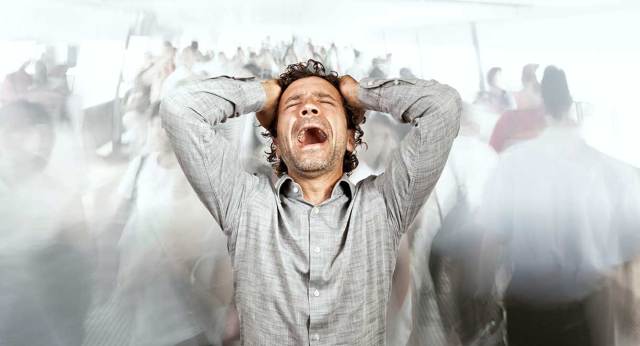
Worrying can be a normal reaction to a stressful situation or something that you may be dealing with, but is anxiety in your head? But if your worrying becomes excessive or continues to be a problem for you, it may be time to seek help.
The world can be a scary place, filled with uncertainties and risks. It’s natural for us to be fearful when we see others hurt or scared. And because of that, many people find it difficult to cope with the negative aspects of life.
When we worry excessively, it can cause us to feel anxious and stressed. It can also make us feel like we are not in control of our own lives. But as strange as it may sound, our worrying can actually be something that we don’t even realize is happening. The best way to stop worrying is to be able to identify the thoughts that are causing it in the first place.
Contents
Is anxiety in your head?
Anxiety can be experienced both physically and mentally. While it is true that anxiety often involves cognitive and emotional symptoms, such as excessive worry, fear, and nervousness, it can also produce physical symptoms, such as increased heart rate, sweating, trembling, and muscle tension. These physical symptoms can contribute to the perception that anxiety is not only in your head but also in your body.
It’s important to note that anxiety is a complex and multifaceted condition that can manifest differently for each individual, and its experience can vary depending on the severity, duration, and cause of the anxiety. If you are experiencing symptoms of anxiety, it is advisable to seek the guidance of a mental health professional who can help you better understand your condition and provide appropriate treatment.
Anxiety is all in the head because we all experience some anxiety at different periods in time, It’s the brain’s way of getting us ready to face or escape danger or deal with stressful situations. But if you’re experiencing anxiety on a day-to-day basis, it could be a sign that something is wrong.
When the brain is releasing chemicals and hormones that make us feel uncomfortable, we call it anxiety.
How is anxiety processed in the brain?
Anxiety involves complex brain processes that are not fully understood, but research has identified several areas of the brain that are involved in the experience of anxiety. The amygdala is a key player in anxiety. It is an almond-shaped structure located deep in the brain that is responsible for processing emotions and detecting potential threats in the environment. When the amygdala perceives a threat, it sends signals to other parts of the brain, including the hypothalamus and the pituitary gland, to initiate the body’s stress response.
The hypothalamus and pituitary gland work together to release hormones, such as cortisol and adrenaline, into the bloodstream. These hormones trigger physiological changes in the body, such as increased heart rate, rapid breathing, and muscle tension, that prepare the body to respond to the perceived threat.
Another area of the brain involved in anxiety is the prefrontal cortex. This part of the brain is responsible for cognitive functions such as decision-making, problem-solving, and emotional regulation. When anxiety is present, the prefrontal cortex may have difficulty regulating the emotional response generated by the amygdala.
In summary, anxiety involves complex interactions between various brain regions, including the amygdala, hypothalamus, pituitary gland, and prefrontal cortex. These regions work together to generate and regulate the emotional and physiological responses associated with anxiety.
Is anxiety a voice in your head?
Anxiety can certainly involve cognitive and emotional symptoms, such as excessive worry, fear, and nervousness, that may feel like a “voice in your head”. The voice may be critical, negative, and self-defeating, leading to a cycle of anxious thoughts and feelings.
However, it’s important to recognize that anxiety is not necessarily a voice in your head, and it can manifest in a variety of ways depending on the individual. Some people may experience anxiety primarily through physical symptoms, such as increased heart rate, sweating, trembling, and muscle tension, rather than through cognitive or emotional symptoms.
It’s also worth noting that the idea of a “voice in your head” is often associated with the experience of hearing auditory hallucinations, which is not a common symptom of anxiety. If you are concerned about hearing voices or other unusual experiences, it’s important to speak with a mental health professional who can help you better understand your condition and provide appropriate treatment.
Often, the voice of anxiety is telling you that something bad is going to happen if you don’t do something to stop it. For example, your anxious brain might tell you that a car crash is going to occur because you didn’t wear your seatbelt.
What’s important to understand about this voice is that it’s not real and that you can control it. The voice of anxiety isn’t something that controls you – it’s just a thought in your head. Anxiety and worrying can feel like an uncontrollable voice in your head, one that is never satisfied with any of your decisions or actions. However, while these worries may seem constant and never-ending, they are almost always pointless.
Is anxiety disorder all in your head?
Anxiety might hinder activity in parts of your brain that can help you cope with and recover from stress while also hyper-activating the brain areas that enable your central nervous system to detect and respond to all threats. Anxiety is often caused by irrational thoughts and feelings, and there is a component of anxiety that is certainly mental.
The parts of the brain that support rational thinking, including your prefrontal cortex, are hindered by anxiety. This can make it difficult to process thoughts and feelings in a logical way, which often contributes to anxiety and related disorders. These two factors are what lead to the physical symptoms of anxiety.
The brain is a complex machine, and it doesn’t always function as we would like it to. Luckily, there are ways you can help the process along! There are some steps you can take to reduce your level of worry and live more satisfactorily with the stressors in your life.
Is anxiety real or just an excuse?
Anxiety is a real and valid mental health condition that affects many people worldwide. It is not an excuse, and it can have a significant negative impact on an individual’s quality of life, relationships, and daily functioning.
Anxiety can manifest in different ways, ranging from mild to severe, and can have various causes, including genetic factors, environmental stressors, and traumatic experiences. It can also co-occur with other mental health conditions, such as depression, obsessive-compulsive disorder (OCD), and post-traumatic stress disorder (PTSD).
Anxiety can be diagnosed and treated by mental health professionals, and there are many evidence-based interventions available, such as therapy, medication, and lifestyle changes, that can help individuals manage their anxiety symptoms and improve their well-being.
It’s essential to recognize that anxiety is not a choice, and individuals with anxiety are not using it as an excuse. Rather, anxiety is a legitimate mental health condition that deserves understanding, compassion, and appropriate treatment. If you or someone you know is experiencing anxiety symptoms, it’s important to seek help from a mental health professional.
Anxiety is real and can be diagnosed using a complete physical examination is essential to rule out other disorders. Anxiety is a mental health condition that occurs when you worry excessively about everyday things—like jobs, money, relationships, or even the weather.
Even if you don’t have an anxiety diagnosis, many people experience these feelings as well. It’s important to understand that these feelings are normal and it doesn’t mean there’s something wrong with you. If your worries are interfering with your day-to-day life, then it may be time to see a doctor for treatment options.
Related: Can anxiety cause headaches?
Can the brain heal itself from anxiety?
Scientists now know that the brain has neuroplasticity- an amazing ability to change and heal itself in response to mental experience. This means that if you are experiencing anxiety, the brain is trying to tell you something. It wants to heal and adjust itself, which is why you need to be mindful of it.
The brain has the remarkable ability to heal itself, and this applies to anxiety as well. With appropriate treatment and self-care practices, the brain can adapt and rewire itself to reduce anxiety symptoms and improve overall mental health.
One way the brain can heal itself from anxiety is through psychotherapy. Therapy can help individuals learn coping skills, identify and challenge negative thought patterns, process traumatic experiences, and develop a more positive and resilient mindset. Different types of therapy, such as cognitive-behavioral therapy (CBT), acceptance and commitment therapy (ACT), and mindfulness-based therapies, can be effective in reducing anxiety symptoms.
Medication can also be an effective treatment for anxiety. Antidepressants and anti-anxiety medications can help regulate brain chemistry and reduce symptoms of anxiety, allowing individuals to better engage in therapy and make positive changes.
In addition to treatment, self-care practices such as exercise, a healthy diet, good sleep hygiene, stress management, and social support can also promote brain health and help reduce anxiety symptoms.
It’s important to note that healing from anxiety is a process, and it may take time and effort to see improvements. However, with the right tools and support, the brain can heal itself and individuals can experience significant relief from anxiety symptoms.
Can brain scans show anxiety?
Brain scans can provide some insight into the neurobiological mechanisms of anxiety and show changes in brain activity and structure that may be associated with anxiety. However, there is no single brain scan that can definitively diagnose anxiety or predict the presence or severity of anxiety symptoms.
Some studies have shown that individuals with anxiety disorders may have differences in brain structure and function compared to individuals without anxiety. For example, functional magnetic resonance imaging (fMRI) studies have shown increased activity in the amygdala, a brain region involved in fear and anxiety, in response to threat-related stimuli in individuals with anxiety disorders.
Other studies have shown changes in the connectivity between brain regions involved in emotion regulation and cognitive control in individuals with anxiety disorders, suggesting that disruptions in these networks may contribute to anxiety symptoms.
However, it’s important to note that brain scans alone are not sufficient for diagnosing anxiety, as anxiety is a complex and multifaceted condition that involves both biological and environmental factors. A diagnosis of anxiety requires a comprehensive evaluation by a qualified mental health professional, taking into account the individual’s symptoms, medical history, and other factors.
Brain imaging can reveal unsuspected causes of your anxiety. In a brain scan, doctors and medical professionals can identify physical issues that may be causing your anxiety. Brain scans are performed by radiologists and often require you to lie down on a table while they take pictures of your head, neck, and spine.
In summary, while brain scans can provide valuable information about the neural mechanisms of anxiety, they are not a substitute for a thorough clinical assessment and diagnosis by a mental health professional.

Ways to Stop Worrying and Start Living Again
Be mindful
One of the best ways to stop worrying is to be mindful. Be mindful of your thoughts and feelings. When you’re thinking about something that’s worrying you, take a step back and notice how it feels in your body. What emotions are you having?
Is there any tension anywhere? How does your breathing feel? Taking some time to notice these things can give you a clearer perspective on what’s going on. Being able to take a step back and recognize patterns will help you with feeling less anxious!
Mindfulness is the first step in staying present in your life. When you’re worrying, you’re often thinking about things that haven’t happened yet or didn’t happen at all. This means you’re not focusing on what’s happening right now and how you can use that moment to your advantage. When you want to stop worrying, be mindful. That will help bring you back into the present moment and help with anxiety management.
Exercise

One way to stop worrying is by exercising (working out). Exercise releases endorphins which can make you feel happier, more energized, and more confident. So, lace up your shoes and get moving.
Exercise is one of the best things you can do for yourself. It increases your heart rate, boosts your mood, and releases endorphins. Exercise also has a significant impact on your general health. You’ll feel better about yourself and have more energy to tackle whatever life throws at you. When you think about it, exercise is just a form of preventative medicine!
Learn to eat right
Eating healthy is a must if you want to be in optimal health, and mental health is no exception. When stressed, your body releases different hormones than it does when you’re feeling calm. One of those hormones is cortisol.
Releasing too much cortisol can leave you feeling anxious, and we all know that an anxious mind leads to more worrying. That’s why eating right or making healthier food choices can reduce anxiety levels. Does this mean that eating unhealthy will make your anxiety worse? Probably not–but it might create unnecessary health problems as well.
One of the most important things you can do for your mental health is to get enough sleep and exercise. Exercise releases endorphins which will leave you feeling more positive, energetic, and happy. Healthy foods are also essential to maintaining a balanced diet. Eating right doesn’t just affect your physical health; it has a huge impact on your mental health as well.
Let go of the past
One of the best ways to stop worrying and start living is to let go of the past. You can’t change what’s happened, and you can’t do anything about it. Dwelling on the past is a waste of time, which can make you feel even more stressed.
Try your best to forgive yourself and show empathy to yourself or others for whatever it is that you did wrong in the past. It will help you move forward and stop worrying about making mistakes because you already made one. The past only controls your future if you let it, so make sure to let it go.
One of the best ways to stop worrying and start living is by letting go of the past. You don’t know what will happen in the future, but you can’t control it either. If you worry about the past and events that have already happened, you won’t be able to enjoy today.

Accept that you can’t control everything
You can’t control everything in your life, and that’s okay. You may feel like you need to be in control of absolutely everything, but the truth is that you don’t. Try not to stress over things that are out of your control. If you focus on what you do have control over, it’ll help stop the worrying cycle.
It’s something that we tell ourselves all the time: just worry less. But how? It turns out that if you want to worry less, you need to live more. That might seem a little backward but it makes sense. If you are worried and anxious all day, your mind is going to constantly think about those worries.
And when your brain is constantly thinking about something, it will never stop worrying because there’s always something that needs worrying about. Stopping worrying means giving your mind other things to focus on.
This could be anything from hobbies or activities like meditation or yoga to spending time with friends and family members who make you feel happy. When you have these things in place and have stopped worrying for a while, it will be easier for you to get back into the habit of not worrying again.
Stop dwelling on the future
The human mind is a powerful thing, and it can make you worry even when there’s no logical reason to do so. For example, as much as you may want to stop worrying about the future, your brain might not be on board—in fact, it tends to dwell on bad things that might happen.
Dwelling on the future only leads to more anxiety. You might find yourself feeling like you have no control over what will happen when in reality, you do. That’s why it’s important not to think about the future too much or too often.
Stop fantasizing and telling yourself stories of how everything will turn out the way you want it
While this may sound counterintuitive, fantasizing and telling yourself stories of how everything will turn out just the way you want it causes more anxiety. It keeps your mind focused on something that hasn’t happened yet and doesn’t change anything in the present moment. Your current worries are still there whether or not you’re dwelling on them—and by focusing on something different for a bit, you’re giving your brain a break from worrying about things that haven’t happened yet.
When you worry about the future, you’re creating more worry in your mind. You don’t know what will happen tomorrow, next week, or next year. All you can do is focus on today and live in the moment. Dwelling on the future only makes your worries worse because you are only fueling them with fear. Instead of worrying about things that haven’t happened yet and may never happen, focus on what is happening now.
Conclusion
Anxiety is a common anxiety disorder in the United States, and it’s all in your head.
As an anxiety disorder, anxiety is often caused by irrational thoughts and feelings, and there is a component of anxiety that is certainly mental. Anxiety can hyper-activate areas in your brain that detect and respond to threats, and at the same time, anxiety might hinder activity in parts of your brain that regulate emotional responses, which is why you might find yourself feeling helpless when you’re anxious.
It’s important to be mindful of the things that may trigger your anxiety, as well as your triggers. Be mindful of when you’re feeling anxious and what’s going on in your head. It’s also important to learn how exercise and diet can help your anxiety. Finally, let go of the past, stop dwelling on the future, and accept that you can’t control everything.
FAQs
Does worrying actually do anything?
Anxiety can feel like a constant time for anyone. One moment you’re feeling optimistic and ready to take on the world. The next, you’re back to obsessing over every little thing. While it can feel like your worries are never-ending, they’re almost always pointless. Your brain might be telling you something that you should listen to but because you worry about everything, it becomes difficult to tell what is important.
How do you deal with anxiety and worry?
Treatment for anxiety can be done through psychotherapy, medications, or self-help techniques like mindfulness exercises. There are several ways to deal with anxiety including exercise, diet, mindfulness, meditation, medication, counseling, and Cognitive-behavioral therapy (CBT). The main issue is to understand that worrying about the future is not necessary.
